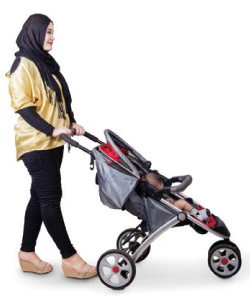Babies have not learnt the gift of speech yet, so they communicate with the only way they know – by cooing at you, smiling, laughing, and (what we dread most) crying. Crying is your baby’s way of communicating with you his feelings of hunger, pain, fatigue, fear and frustrations. It is also a way for him to shut out sights, sounds, and any other sensations that may be too intense for him. As parents, you can influence the length of time that your baby cries by responding to him, and this has been proven by studies.
It is important to realise that every baby is unique. Your baby may be a very calm and well-behaved individual or he may have fussy periods throughout the day, even when there are no obvious reasons for it. Regardless of how often he cries, it is important that you pay close attention to his cries. You will notice a difference between the type of cry, which will let you know whether he needs to be cuddled or tended to, or whether it would be better to leave him alone.
Should You Leave Baby Alone When He Cries?
The short answer to this is ‘No’. While it is true that babies left to cry eventually stop doing so, there are emotional/psychological consequences. Studies have shown that infants left to cry would lead to the crying episodes dissipating. However, the studies also showed that this was due to feelings of apathy in the child, i.e. the baby stops crying as he loses hope of getting attention from his caregiver not because the reason for his distress is gone.
On the other hand, crying babies who were attended to immediately tended to cry and fuss less often. This results in a lower overall cumulative duration of crying than babies who were deliberately ignored.
Familiarity Breeds Understanding
Sometimes the reason for a baby’s cry is immediately apparent, e.g. most babies will cry if a stranger or someone they are unfamiliar with tries to take him away from their primary caregivers. However, there are numerous other reasons why a baby cries. The key to identifying the reason for his cry is to familiarise yourself with his cries. In this way, you will learn how to identify his specific needs just by hearing the way he cries. As a general guide:
- Hunger – is often short, low-pitched, and rises and falls
- Anger – tends to sound a lot more agitated
- Pain or distress – happens suddenly and is often characterised by a loud, long, high-pitched shriek which is followed by a long pause and a flat wail.
- Do not disturb – this type of cry sounds very similar to a hunger cry, and is usually baby’s way of letting out some steam.
It won’t take long before you have a pretty good idea of what your baby’s cries are trying to tell you. If you can attend to him immediately, he will feel better and will most likely stop crying. Failing to respond to his cries, on the other hand, can worsen the situation.
However, it is possible for different types of cries to overlap. For example, newborns may awaken feeling hungry and start crying for food. If you take too long to respond, his crying will probably change to one of rage and frustration!
The best method to deal with your baby crying is by responding as quickly as possible to any of his cries, during the first few months of his life. Don’t worry, giving him your care and attention at this point will not spoil him. In fact, taking immediate action to his cries helps ensure that he cries less overall.
Tips to Handle Crying
It’s important to prioritise when responding to your baby’s cries. Take care of the most pressing needs first – if he is cold, hungry and has a wet diaper then you should warm him up, change his diapers and then feed him. If he cries with a shrieking or panicked quality to the cry, there is a high likelihood that something is causing him discomfort, e.g. the stitching on his clothing may be pricking his sensitive skin or a strand of hair may be tickling his eyes.
If you have checked to ensure that your baby is warm, his diapers are dry, and he has already been fed but continues to cry, these are some techniques you can try:
- Rocking him in your arms: You can do this seated, standing, or while walking around. Be sure to use gentle motions when you rock him, and try all three positions to see which works best as he may have a particular preference for one position over the other.
- Gently stroking him: Try cradling him protectively in your arms while stroking his head or patting his back. Alternatively, you can try stroking his head and/or chest while he remains in his bed.
- Swaddling: Wrap him snugly (but not too tightly) using a comfortable blanket.
- Singing or talking: Keep your voice as calm, warm, and loving as possible while you talk or sing to him. If you cannot do so, let someone else take over while you take some time to calm down.
- Let him suckle: Allow him to suckle at your breast – this may help to calm him down. Also, don’t forget to burp him after each feeding.
- Hold him close: Use a baby carrier or sling so he can be close to you. Be sure to move gently while carrying him about.
- Go for a stroll: Put him in his stroller and go for a walk around the house or outside, if the weather permits. Alternatively, you can simply rock him back and forth. Another option is to take him out for a drive (be sure to use a car seat) – the rhythmic motion of the stroller/car is often soothing and should help lull him to sleep.
- Play soothing music/sounds: Try playing some nice soothing and relaxing sounds/music. Ensure that the volume is not too loud as it may disturb him instead. You may want to combine this with some mobiles above his cot to distract him.
- Try baby massage: A gentle and soothing baby massage may be just what he needs to wind down. Do consult his paediatrician for advice on how to proceed if you are unsure or if you suspect colic as a reason for his crying.

Stay Calm and Breathe
It will be a lot easier for you to console your crying baby if you can maintain a calm and relaxed demeanour. Although a baby’s wails can be agonising to listen to, allowing it to frustrate you and make you angry or panic will only lead to a more intense bout of crying. Babies always sense our anxiety and anger. Keep in mind that your baby’s cries are not a reflection of bad parenting, so don’t take it personally.
If, at any point in time, you start feeling as though you cannot handle things, ask for help from your spouse or a family member. This will allow you to regroup and get a grip of the situation. Most important of all, never ever shake your baby, no matter how impatient or angry he makes you feel.
Learn to take a realistic approach and get help whenever necessary. Equally important is to take care of your own health by getting sufficient rest, and lastly, enjoy these few short, wonderful moments with baby.
An educational contribution by Malaysian Paediatric Association.







Comments